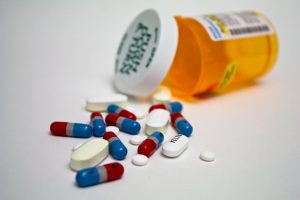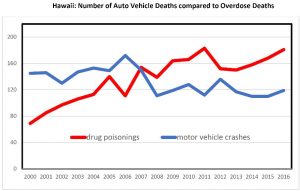Governor takes action on opioid abuse, prevention
Posted on Sep 26, 2017 in Capitol Connection, Featured
“Drug abuse is a public health issue. People of all ages are at risk when they’re prescribed painkillers,” said Eddie Mersereau, the state DOH chief of the alcohol, drug abuse division. “In fact, more people in Hawai‘i are dying of accidental drug overdose than from car accidents, and most of those cases involve opioids.”
DOH director Ginny Pressler explained, “Governor Ige wants to take an aggressive approach to get ahead of the opioid problem here. Our goal is to leverage the opioid abuse discussion to improve the system and treat drug addiction as a chronic disease that impacts everyone.”
How did this become a crisis nationally? “From the early ‘80s, doctors shifted to treating pain with powerful painkillers as the first response,” Mersereau said. “Once hooked, people pass a point where they don’t just need the drugs for the pain. If they can’t get more meds, they turn to the black market or ‘doctor shopping’ to get more pills — even resorting to something like heroin.”
In the coming months, DOH will be developing a comprehensive, coordinated action plan to combat opioid abuse statewide, helped by $10 million in federal funds to expand prevention and treatment programs. Actions include:
• Prevention and intervention – Mersereau said the state is working with doctors to include a regular patient interview question to determine if there are substance abuse risks and provide interventions. The goal is to provide early screening for substance abuse.
• Expanded access to “opioid antagonists” to prevent overdoses – This involves health care professionals, first responders and social services workers who can administer drugs such as Naloxone to “reverse” opioid overdoses. The CHOW project is helping the state distribute more Naloxone kits over the next two to three years.
• Implementing Act 218 and Act 66 to limit the inappropriate prescribing of narcotic drugs and provide a monitoring system as part of a state controlled substances registration process.
• Continuing a take-back program so patients can drop off unused medications for safe disposal instead of just throwing them in the trash. The next take-back day is set for Oct. 28 from 10 a.m. to 2 p.m. at several sites statewide. For details, go to ag.hawaii.gov.
“We want to catch the problem in the doctor’s office and leverage the funding to treat other forms of drug abuse,” said Mersereau. “The good news is the people in this administration are working together — more than I’ve seen in my 27 years in public health — to tackle issues like drug abuse that affect everyone in some way. With the governor’s leadership, I think our department feels this is a chance to make systemic, lasting change.”
Read more in our October issue
